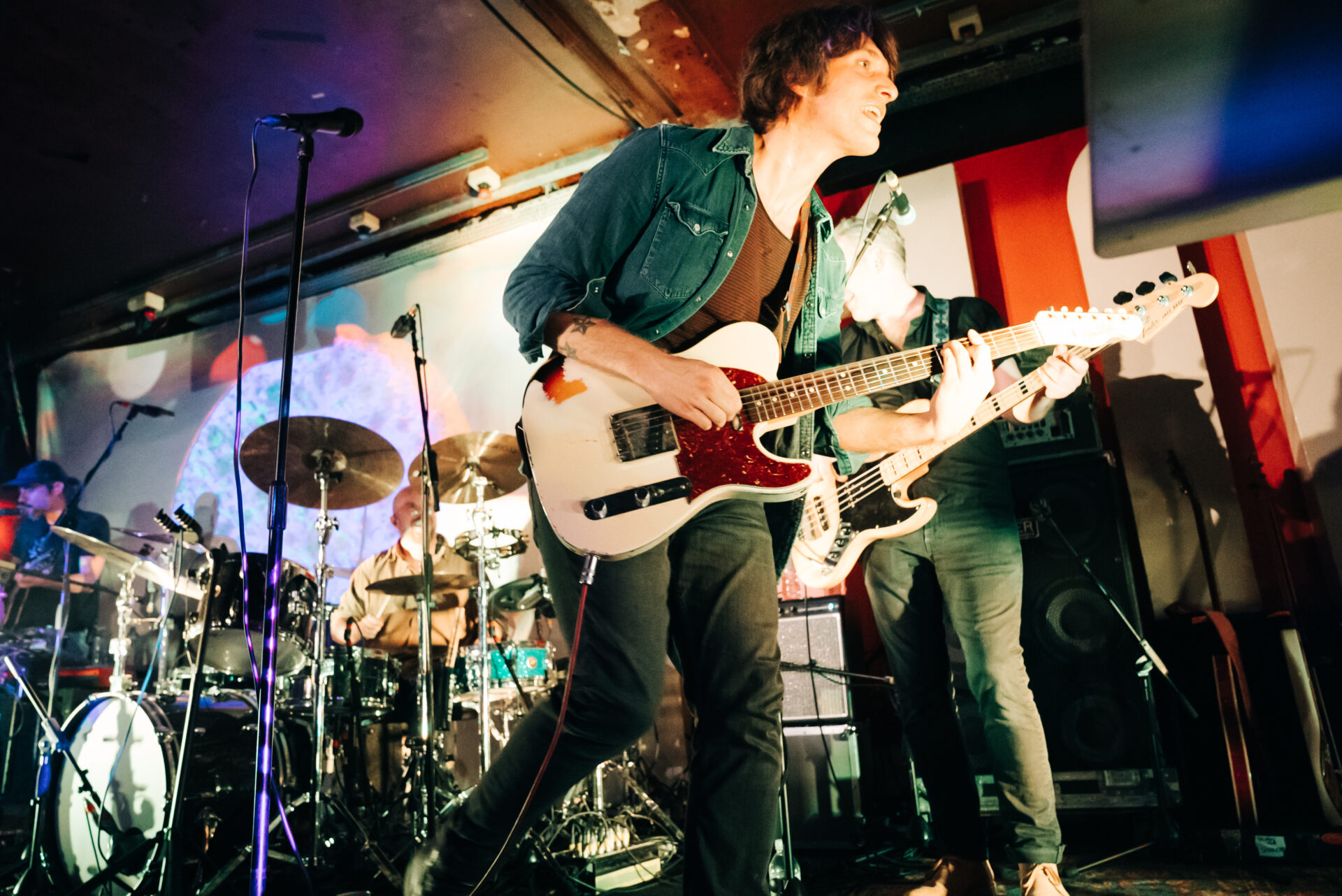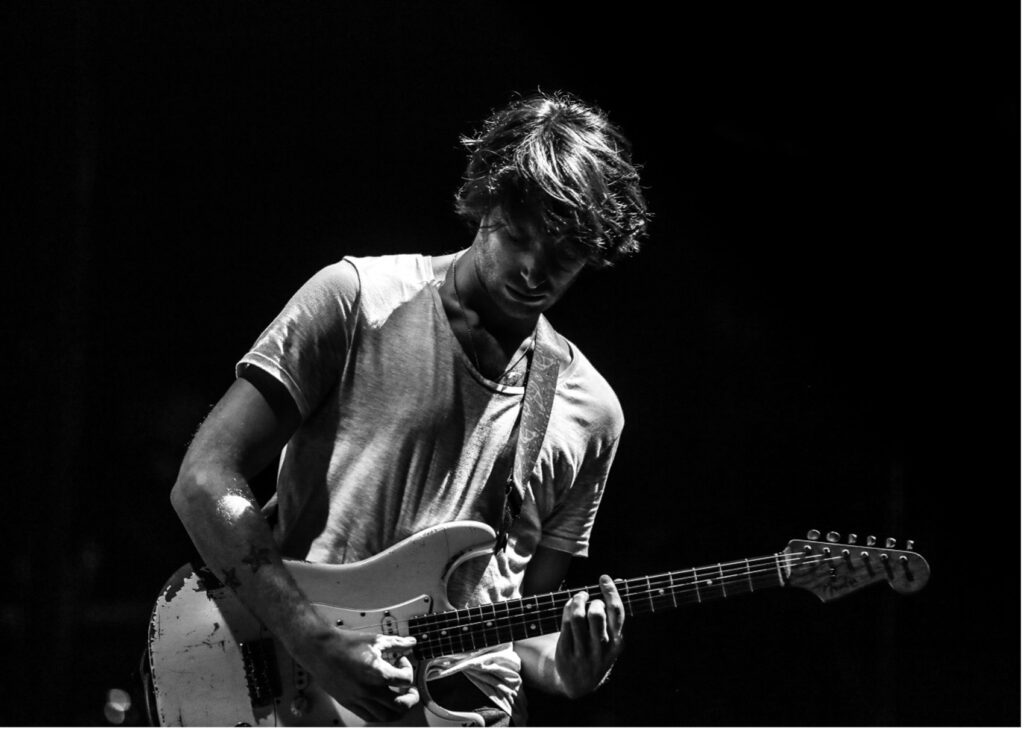Paolo Nutini: the comeback kid
Paolo Nutini has been conspicuous by his eight-year absence. As he breaks his silence with new album ‘Last Night in the Bittersweet’, he tells Rolling Stone UK what he’s been up to and why he can’t wait to perform live
By Nick Reilly

“Right, enough’s enough,” tweeted Scottish superstar Lewis Capaldi in early 2020, “where the fuck is Paolo Nutini?”
The tweet clearly struck a chord. It garnered 13,000 retweets from a legion of fans who, like Capaldi, were eagerly awaiting the return of one of Scotland’s most distinctive voices. At that point, it had been six years since Nutini’s acclaimed third album, Caustic Love — a record which saw him delivering a timeless and enduring love letter to R&B and soul. But when touring duties for that album came to an end, he largely disappeared from the limelight. Bar a handful of charity performances in 2017, there was nothing to hint at a full return.
Some two years and the small matter of a pandemic later, the artist has finally made his much-anticipated comeback with Last Night in the Bittersweet, a record which justifies that absence and is arguably his most complete to date. It sees Nutini’s blue-eyed-soul vocals paired with a vast, kaleidoscopic sound that takes in everything from the recent trend for spoken word on the rocking ‘Lose It’ to hints of Krautrock on the sprawling ‘Heart Filled Up’.
Still, the question remains: just where has Nutini been for the past eight years?
The answer emerges as Rolling Stone UK sits down with him at a London hotel in mid-May. As we talk, he is at the end of a rousing five-night residency at the legendary 100 Club which has been attended by fellow singers Capaldi and Geordie star Sam Fender, who shared Instagram videos from the show and hailed Nutini as one of his teenage heroes.
“The realities of doing this and the whole experience doesn’t feel entirely natural to me,” he says of performing. “I’m not the most extroverted person, but when you’re on a stage you find yourself opening yourself up in that way. The more vulnerable the better, too, when you’re trying to give your audience a piece of you and you’re hoping to get something back. Once that ends, I’ve always had to recalibrate my fucking brain.”
That process of recalibration, it turns out, took the form of a journey to retrace his steps. He had lived the life of a global touring artist but, as is so often the case, found himself restricted to doing short stop-offs in cities which meant he was unable to truly acquaint himself with his surroundings.
“Sometimes you’d just get a couple of nights in these places and a small taste of what they’re about. I tried to go back and spend some time there,” he says of his globetrotting downtime. “I’m lucky I’m able to do that. I’d go away on a Monday and say I was coming back on a Thursday, but I’d return two months later, having made some great, mad experiences along the way.”
“I’m not the most extroverted person, but when you’re on a stage you find yourself opening yourself up”
— Paolo Nutini
Throughout, Nutini says he never stopped writing; indeed his travel adventures have shaped the sound of the record. Its title, he explains, reflects a period of personal turbulence he has been living through behind the scenes.
“There was a long period of life for me that could have been defined as bittersweet. The juxtaposition between the ups and the downs was really quick. It wasn’t in terms of my career, just emotionally,” he confides.
“I think I became very content in that rhythm and I guess there was a point where I sought to move out of that and become a happier person. I’m still in the process, but it was a conscious attempt to figure out what was causing that and to try and conquer that.”
Although he refuses to dwell on the subject for too long, he adds: “A lot of the stuff I was doing to myself, I wasn’t dealing with myself in ways that were the healthiest. I was just compromising who I was a lot and I wasn’t giving myself a lot of care or respect. That was holding me in a position that I wanted to get out of.”

These experiences are only too clear on the album. A late stand-out comes in ‘Abigail’, a Bert Jansch-esque folk number which sees the 35-year-old Nutini wistfully dreaming of a life of domestic bliss with a wife and children. “Lord I wanna get happy, before I get old,” he purrs on the contemplative track.
“I wanna be a happy person and I’m not always content,” he says of the song, which was written in his parents’ garden while he bubbled up with them during lockdown.
“But again, it was recognising this need to make changes in order to be a happier person. It’s not something that someone can exclusively do for you. There’s so many different reasons why people could be looking at themselves in the way I was, but it became very clear that the problem was me.”
“There was a long period of life for me that could have been defined as bittersweet. The juxtaposition between the ups and the downs was really quick”
— Paolo Nutini
Still, this introspection is merely one aspect of a record which overwhelmingly fizzes with the energy of a man who is happy to be back at the day job once more.
Take the opening track, ‘Afterneath’, which opens with a soul-searing howl from Nutini, before psych-driven guitars eventually make way for an unlikely sample of Patricia Arquette’s memorable speech in the final scenes of True Romance, the 1993 cult classic written by Quentin Tarantino.
In order to use it, Nutini personally sought clearance from the film-maker himself. “It’s a brutal film but also a beautiful story as well and I just always wanted to use that little speech,” he tells me. “We asked Tarantino if we could use it and, luckily, he said yes, which we were told wasn’t entirely common practice, which made it nicer. It was a cool thing.”
Elsewhere, the inspiration for the aforementioned narrated style on ‘Lose It’ struck while he burned the midnight oil in the recording studio.
“When you start a song that late and you come out with an idea, if someone’s reaction is just more than ‘Let’s fucking go to bed,’ then you’re onto something. And that’s what happened.
“I’m not sure what led me down that path. It was a quick song to come together and a lot of what you hear came from the exceptional players that were able to add to it.”
The timing of his return, Nutini reveals, has left him with a newfound appreciation for what he does. Although his latest collection of songs is far from a pandemic album, he says the lack of community and socialising during that time certainly hastened his comeback.
“I’ve never stopped writing songs and writing ideas and that’s what gives me my kicks. Even if they sit half-finished for a year, I feel like I’m happy regardless of what I’m doing at the time,” he says.
“I’ve never stopped writing songs and writing ideas and that’s what gives me my kicks. Even if they sit half-finished for a year, I feel like I’m happy regardless of what I’m doing at the time”
— Paolo Nutini
“But over the past two years, watching how it’s affected everybody, that social shutdown, it made me think that it is a real privilege to go out and communicate with people on such a scale. And to have the outlet of release that performing on a stage can give.”
Performances, no less, that include a headline set at TRNSMT Festival in Glasgow, a party-starting city in a country where the Paisley-born singer’s music has elevated him to godlike status. That set represents his biggest chance to finally show off his sprawling opus of a fourth album.
“I get the tunes out there and I already feel a bit lighter,” he says. “But it’s not just that; you’re giving other people a good buzz and a good kick. It’s a good feeling. It makes you feel like you’re doing something right.”
After such a long period away, you sense that none of his fans would argue with that.
Taken from the forthcoming issue of Rolling Stone UK. Buy it here.
